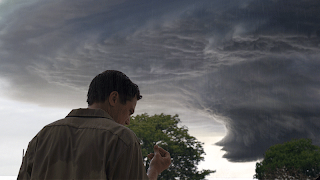***1/2 out of ****
Directed by: Jeff Nichols
Starring: Michael Shannon, Jessica Chastain, Shea Whigham and Tova Stewart
Running time: 120 minutes

American character actor Michael Shannon always seems to have a look of petrified worry on his face. That could just be the way he looks, or that the kinds of dangerous, unhinged characters he’s played throughout his career have become so memorable.
You’ve likely seen this look if you saw Revolutionary Road, which earned him an Oscar nomination in 2008, or HBO’s Boardwalk Empire, where he has a recurring role as the special agent going up against Steve Buscemi’s sleazy politician.
But Shannon takes leading man duties in the tense, superbly acted thriller Take Shelter, where he blends in his uneasy stature and demeanor with a hardworking everyman type to masterful effect.

Here, he plays Curtis, a construction worker, husband and father in the American Midwest. We first meet the character as he watches a tornado suck up the fields in the distance, as foreboding clouds approach and orange rain pelts his home. This is just a dream, but the delusions of impending destruction keep rattling at his psyche.
At work, he is distracted with visions that only he can see, like flocks of birds flying in disorient, as well as sounds of thunder on a balmy day. Disturbing thoughts return at night, and Curtis’s howling in bed begins frightening his wife, Samantha (Jessica Chastain).

Do the hallucinations signify a psychological disorder, like the schizophrenia that Curtis’s mother developed when she was in her thirties, or are they a forecast of a stormy apocalypse ahead? Curtis weighs both options, although he’d rather acknowledge the latter.
Without informing Samantha – who he has been saving up with to pay health insurance for their deaf daughter, Hannah (Tova Stewart) – Curtis starts putting together a tornado shelter in the backyard.
All of the characters feel normalcy except for our protagonist. Curtis believes that these visions aren’t just dreams, since in some instances, they leave him physically scarred. He is the only one who can feel the wrath of something dangerous hurdling toward his community.

Writer/director Jeff Nichols’ film – only his second, and an arresting one at that – grants us Curtis’s point of view. As a pitter-patter piano triplet underscores the tension, the audience's feelings of normalcy and comfort also start to disintegrate.
Chastain sums up a landmark year in 2011 in another stoic performance as a graceful mother. As she unravels, trying to figure out her husband’s alusive behaviour, she is every bit as riveting as Shannon, who delivers a career-best performance. His nuanced American everyman becomes increasingly fierce as the premonitions become more pronounced. The tension builds up to two mesmerizing displays of unsettling ferocity by the protagonist, one delivered to the community and the other to his family.

Take a look back at the past few years, and realize that a lot of the disasters around us could have been avoided. I presume you also remember the tale about the boy who cried wolf. An anxiety of impending terror underlines every scene in Take Shelter, making it not only one of the best psychological dramas in recent memory, but also one of the most relevant.






















